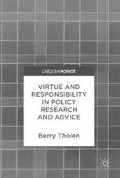Abstract
The choices that must be made in the second phase of a scientific study also inevitably involve social values. First, there are the values that urge the scientist to respect the subjects he researches (e.g., animals, environment, or human beings). Second, choices must be made between measuring instruments that are epistemologically equivalent but might have different social consequences. Third, choices must be made about the level of risk of being wrong that is acceptable.
Access this chapter
Tax calculation will be finalised at checkout
Purchases are for personal use only
References
Boghossian, P. (2006). Fear of Knowledge. Oxford: Oxford University Press.
Douglas, H. E. (2007). Rejecting the Ideal of Value-free Science. In H. Kincaid, J. Dupré, & A. Wylie (Eds.), Value-Free Science? (pp. 120–141). Ideals and Illusions. New York: Oxford University Press.
Douglas, H. E. (2009) Science, Policy, and the Value-free Ideal. Pittsburgh, PA: University of Pittsburgh Press.
Elgin, C. (2004). True Enough. Philosophical. Issues, 14, 113–131.
Jasanoff, S. (1990). The Fifth Branch: Science Advisers as Policymakers. Cambridge, MA: Harvard University Press.
Jasanoff, S. (2015). Serviceable Truths: Science for Action in Law and Policy. Texas Law Review, 93, 1723–1749.
Majone, G. (1989). Evidence, Argument, and Persuasion in the Policy Process. New Haven: Yale University Press.
Popper, K. (2002). Science: Conjectures and Refutations. In: idem, Conjectures and Refutations (pp. 43–78).London: Routledge.
Rudner. (1953). The Scientist Qua Scientist Makes Value Judgments. Philosophy of Science, 20,1–6.
Author information
Authors and Affiliations
Corresponding author
Rights and permissions
Copyright information
© 2018 The Author(s)
About this chapter
Cite this chapter
Tholen, B. (2018). Deciding on Tools and Risks. In: Virtue and Responsibility in Policy Research and Advice. Palgrave Macmillan, Cham. https://doi.org/10.1007/978-3-319-65253-5_4
Download citation
DOI: https://doi.org/10.1007/978-3-319-65253-5_4
Published:
Publisher Name: Palgrave Macmillan, Cham
Print ISBN: 978-3-319-65252-8
Online ISBN: 978-3-319-65253-5
eBook Packages: Political Science and International StudiesPolitical Science and International Studies (R0)

